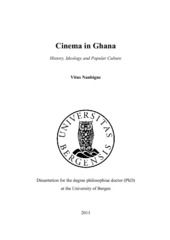| dc.description.abstract | In spite of many years of research, theorizing, debate and contestation, there is always freshness about discourses on national cinema because of its contextual transformations. More importantly, apart from several European nations, North America, Australia, China, and Indian, where national cinema studies have been extensively conducted, nations in Africa, Latin America and the Caribbean have not received the same academic attention. Discourses on national cinema are also fresh because of changing methodological and theoretical approaches which are dependent on the historical, industrial and cultural contexts of each nation’s cinema. Cinema in Ghana- History, Ideology and Popular Culture, is an attempt to start a dialogue about national cinema in Ghana. The primary purpose of this thesis is not simply to provide a historical account of cinema in Ghana, but rather to question and dialogue with the history in order to locate the texts and contexts that inform a national cinema here. The thesis takes as a point of departure the broader political, cultural and aesthetic nuances of filmmaking in Africa and then focuses on the specific case of Ghana. The literature available on cinema in Africa suggest heterogeneous and complex practices which implicate serious political and cultural discourses, but also offer the mundane entertainment value often associated with popular cultural products. Cinema in Ghana begins by questioning African cinema, and opens up complex discourses of identity, ownership, cultural mediation, industrial and economic practices and the influence of globalisation on the iconography of African films. To understand African cinema is to interrogate issues of ideology, narrative, aesthetics, the economics of ownership and the role or social value of the cinematic product. This thesis is an attempt to identify a national cinema in Ghana as a microcosm of cinema in Africa. To appreciate the specificity of Ghanaian national cinema requires an engagement with discourses on nations, nationhood and nationalism. Issues of national culture and identity, and concerns over representation are brought to bear on the assumptions of nationalism and national cinema. The thesis acknowledges that the task of isolating a national-cultural specificity is problematic, just as it is contentious to talk about the cultural specificity of local genres or nation-state cinema movements, particularly in the era of globalisation. Cinema in Ghana acknowledges the limitations of the concept of national cinema as a seamless whole and does not pretend to offer a coherent, unified, and homogeneous concept in the case of Ghana. Rather, it offers a broad theoretical reading of the history of cinema in Ghana vis-à-vis the political and cultural transformations that have taken place over time, and how these have impacted on assumptions of nationhood and therefore national cinema. These transformations started from the colonial period when cinema was first introduced to native people in Ghana, mainly for colonial political purposes. These early film screenings were not important for Ghanaian nationalism even though they set the stage for nationally specific cinema. Cinema in Ghana traces the political and cultural shifts that informed the production and consumption of films in Ghana, with emphasis on particular historical events and films which represented an essence of Ghanaian nationalism, and therefore national cinema. For example, by the start of the 1950s, as independence from colonial rule was imminent, some of the films produced by colonial film crews, ironically, were in the interest of Ghanaian nationalism, such as The Boy Kumasenu (1952) and Freedom for Ghana (1957). After independence in 1957, cinema was put to the service of the new nation, and national cinema was born in Ghana. The thesis broadly discusses the short dramas, documentaries and feature films that were produced as part of efforts to consolidate political and economic independence. Using various theories of national cinema, the thesis interogates the history of film and video production, distribution and consumption in Ghana in order to answer the question, “when is cinema in Ghana national?” This question is important because national cinema was more conspicuous during the first three decades of independence. However, the influx of mainly amateur videos, from the late 1980s to 2009, whose motive was profit rather than serve a national interest, further complicated the concept of national cinema within the Ghanaian context. The thesis therefore concludes by suggesting that new modes of analysis, new models and new approaches need to be discovered for the study of national cinema, particularly in Africa, where cinema is undergoing tremendous transformations. | en_US |
